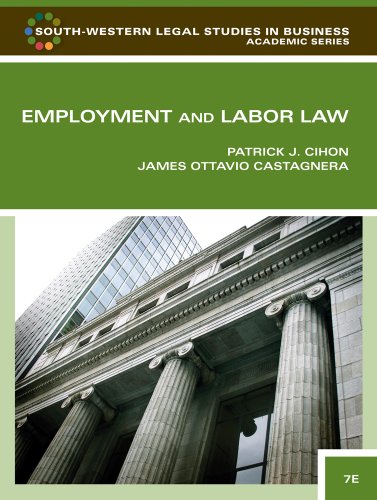Dura Automotive Systems operates a factory manufacturing auto glass window units through a manufacturing process involving high
Question:
Dura Automotive Systems operates a factory manufacturing auto glass window units through a manufacturing process involving high temperature injection molds and cutting machines. Lately there had been a high rate of workplace accidents at the facility and managers suspect that drug use by the workers was the cause. Dura hired FFS, a consulting firm, to implement a comprehensive drug testing program. The program would test for twelve substances which the parties believed could create a safety risk in a manufacturing facility.
Some of the substances were found in legal prescription drugs. The drug testing involved an initial screening test of urine samples provided by the employees. If the initial screen tested positive for one of the banned substances, the employee’s sample was then subjected to a confirmatory test.
The results of the confirmatory test were then reviewed by a licensed medical review officer, who would contact the employee to determine if there was a medical explanation for the positive result. If the employee provided a valid medical explanation and documentation—such as a medical prescription for a drug containing one of the banned substances—the medical review officer would change the test results from “positive” to “negative”
and forward the results to FFS, who then relayed the results to Dura.
Dura management, however, regarded the confirmatory testing as irrelevant—they required any employee whose initial test result was positive to provide a list of all the medications that the employee was taking. Dura then sent letters to the employees taking such medications, informing them that they were placed on thirty-day leave to allow them to transition to a different medication or to stop using the medication altogether. Dura ignored letters from employees’ physicians stating that the medications would not affect the employees’ performance and were necessary for the employees’ health. Employees who failed the initial drug test were permitted to take another test within thirty days—and if the second test was negative, the employee was allowed to return to work. But if the second test was positive, the employee was placed on indefinite layoff and was terminated after six months. Dura also implemented randomand “post layoff return” drug testing, and any employee failing such test could be terminated immediately.
Several Dura employees who failed an initial drug test because they were taking legally prescribed medications containing one of the banned substances had their initial “positive” results changed to
“negative” by the medical review officer after documenting their medical need for the prescription drug; however, Dura would not allow them to return to work, and they were ultimately terminated by Dura. Those seven employees file suit against Dura under the ADA. Is Dura’s drug testing policy a violation of the ADA? Explain. See Bates v. Dura Automotive Systems, Inc., 2009 WL 1108479 [M.D.
Tenn. April 23, 2009].
Step by Step Answer:

Employment And Labor Law
ISBN: 9781439037270
7th Edition
Authors: Patrick J. Cihon , James Ottavio Castagnera





